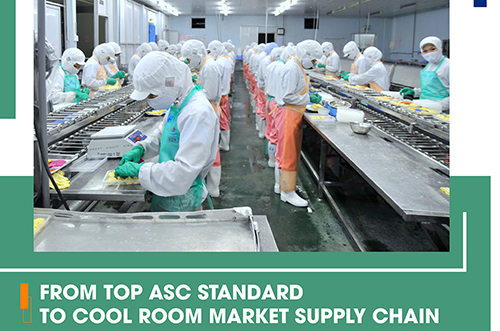
Supply chain management becomes a “burning” issue, especially in developing cool room systems for product storage. This is a great challenge for enterprises in agriculture and fisheries, pharmaceuticals… Besides, the ASC standard – one of the strict standards in aquaculture – also brings many challenges for enterprises.

ASC standard is based on four main foundations: environment, society, animal welfare, and food safety. Certification under the ASC standard is an international certification for responsible aquaculture, minimizing adverse impacts on the environment, ecosystems & communities, and ensuring good labor regulations.

According to Ms. Esther Luiten, Global Commercial Director at the Aquaculture Stewardship Council (ASC) at the ASC STANDARD WORKSHOP: INTEGRATION AND PRACTICALITY: “The updated global aquaculture certification program has expanded to “12” farm standards.”
Consolidation of 11 farmed species standards into a single standard

ASC is making great strides in aiming to become the world’s leading certification and labeling program for responsible aquaculture. ASC brings safe seafood products from farms to markets, while minimizing environmental and social impacts. Aquaculture Stewardship Council (ASC) standards help companies and organizations promote and identify that fish farming has been done responsibly.

ASC standards can be said as a guideline for fishery exporters and processors in the context of the highly demanding market. ASC is implementing a number of major improvements to improve standards, materials, and tools for farms, feed plants, and enterprises in the supply chain.
The standard covers many aquaculture processes globally and considers both the environmental and social aspects of farms to ensure responsible production processes. This provides rules for purchasing, processing, and trading ASC-certified products. Consumers, retailers, and businesses turn to highly reliable products, opening up opportunities in international markets such as the US, Europe, China, and Japan.
ASC standard plays a big role in aquaculture enterprises and farms. There are many great benefits to achieving this certification.

In addition to the “story” of investment in cold storage, seafood enterprises aim for the ASC certification process, including fish from “farm to plate” to ensure traceability for all products. Certification under ASC standards is an international certification for responsible aquaculture, minimizing adverse impacts on the environment, ecosystems & communities, and ensuring good labor regulations.

Understanding the importance of cold storage systems, seafood enterprises have also made efforts to invest in cold storage. However, in fact, not every cold storage meets the requirement. Common problems include rust, discolorment, stagnant water, and corrosion… This is not only an appearance problem but also affects the quality of product preservation. So, the story of investment for cold storage is not only a matter of willingness to spend a budget on this important item but also about choosing a solution that is the most suitable and effective.

Ms. Trinh also said, “The storage areas of the aquaculture sector have three separate areas, including ones for production, cool room, and each requires different panels. NS BlueScope’s COLORBOND® alloy-coated steel is suitable for installation in cool rooms, which ensures good appearance, and, more importantly, good thermal insulation and superior corrosion resistance, overcoming even the harshest environment, such as proximity to the sea, pollution in industrial zones, etc.”
In order to meet the needs of enterprises, NS BlueScope Vietnam has launched the product of COLORBOND® for Panel | Cool Room with unique features thanks to Activate™ unique 4 phases alloy-coated technology in Vietnam. The four compounds arranged at strategic locations of Activate™ technology help to enhance the anti-corrosion resistance of the alloy-coated steel at the cutting edge in washed or unwashed areas, protecting the base steel in the harshest environmental conditions such as cold rooms.

In addition, Activate™ technology has passed rigorous international tests with superior quality results, such as the test of exposing the sample for 22 years, and the Q-Fog test of exposing the sample to continuous salt mist for 2,000 hours.

It can be seen that fulfilling all the requirements of ASC standards is a prerequisite for Vietnamese seafood to “swim in large seas”. The choice of a cool room solution will help Vietnam’s exported seafood to reach consumers in large and difficult markets. Compliance with standards, techniques, and technologies of aquaculture and processing in the direction of quality will also contribute to securing a firm position for the products of Vietnamese enterprises on the world seafood supply map.








Comment